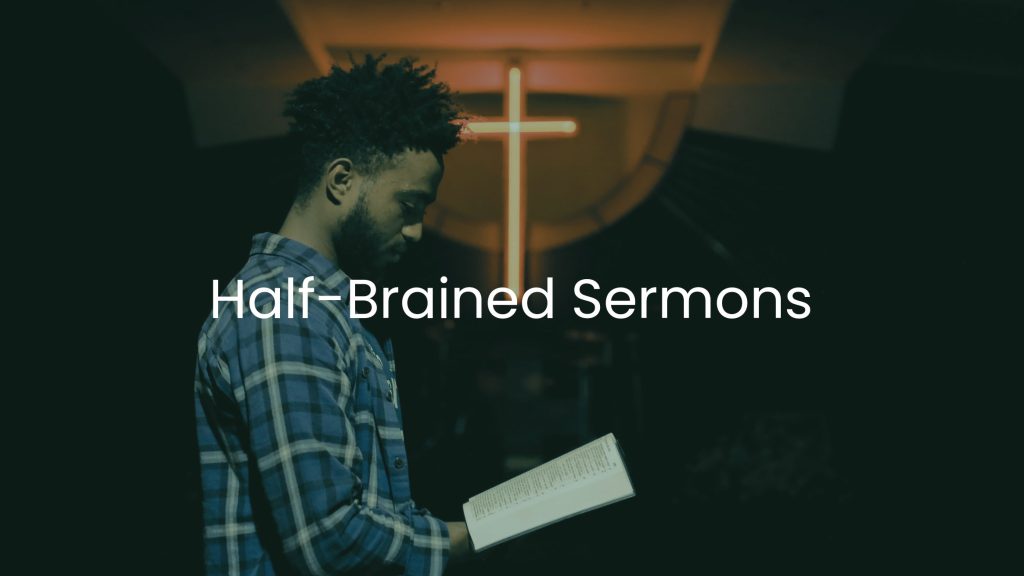|
Getting your Trinity Audio player ready...
|
A college professor said to me, while we were discussing the importance of preachers knowing the basics of the Greek language, that “I once heard a man say that anyone with half a brain can read and understand Scripture; well, I’ve heard a lot of sermons by preachers who seemed to have only half a brain.”
I got the point and studied Greek, but his comment stuck with me. I asked myself many times while preparing a sermon, “How do I make this sermon not seem so half-brained?” A great fear of mine became half-brained sermons.
And more importantly, how can we, while reading our Bibles, stay away from half-brained conclusions?
The secret to a more full-brained approach to the Bible can be found in 2 Peter 1:19-20 …
And we have the prophetic word more fully confirmed, to which you will do well to pay attention as to a lamp shining in a dark place, until the day dawns and the morning star rises in your hearts, knowing this first of all, that no prophecy of Scripture comes from someone’s own interpretation (ESV).
When correctly discerning God’s Word, the Greek word for “interpretation” yields a clue. This word (Gr.: epilusis; or Eng.: interpretation) is two words: “epi,” which can be translated as “upon,” and “lusis,” meaning “loose,” with many translators putting the two words together as “unpacking” or “untying knots” or, in many English versions, “interpretation.”
A half-brained understanding of the Bible can be eliminated by untying our own faulty ideas from Scripture. Below are three rules of full-brained interpretation …
First: Context, Context, Context
The following verses have one meaning if read alone, but a different meaning when read in the context of the entire New Testament.
Greet one another with a holy kiss. All the churches of Christ greet you (Romans 16:16).
Baptism, which corresponds to this, now saves you, not as a removal of dirt from the body but as an appeal to God for a good conscience, through the resurrection of Jesus Christ (1 Peter 3:21).
Aren’t we glad that correct context gives us permission for a handshake instead of a holy kiss! And that complete Biblical understanding of grace denies that “baptism” is the New Testament’s version of the Old Testament’s circumcision.
Second: Obey, Obey, Obey
But be doers of the word, and not hearers only, deceiving yourselves (James 1:22).
There is a plain sense of Scripture that is easily understood by common sense. However, our thinking becomes distorted when we refuse to obey God’s Word. And then, along with losing our sensical understanding of Scripture, we enable an interpretation that teaches the exact opposite of what the Bible says. Thus, abortion, mixed gender identity, open marriages, and your personal desires become God’s will.
As James says, if we are hearers only, we begin deceiving ourselves. As one author wrote, “It will be argued that common sense will keep one from such foolishness. Unfortunately, without faith in God’s Word, common sense is not always so common.”
Third: Abide, Abide, Abide
Intellectual pursuit yielding proper context, and a desire to follow God, no matter the difficulty or unpopularity of our obedience, both find fulfillment while abiding in Christ.
If you abide in me, and my words abide in you, ask whatever you wish, and it will be done for you. By this my Father is glorified, that you bear much fruit and so prove to be my disciples (John 15:7-8).
Abiding in Christ establishes a relationship of love. With love being the most powerful motive known, loving Jesus creates a passion for truth that still has love, and while insisting on obedience, allows for the perfect judgment that comes only from Christ.
HHHHMMMHHM — heard any half-brained sermons lately? Let’s remember context, obey, and abide. And by the way I’m speaking at all services at Fellowship the weekend of November 29&30.

